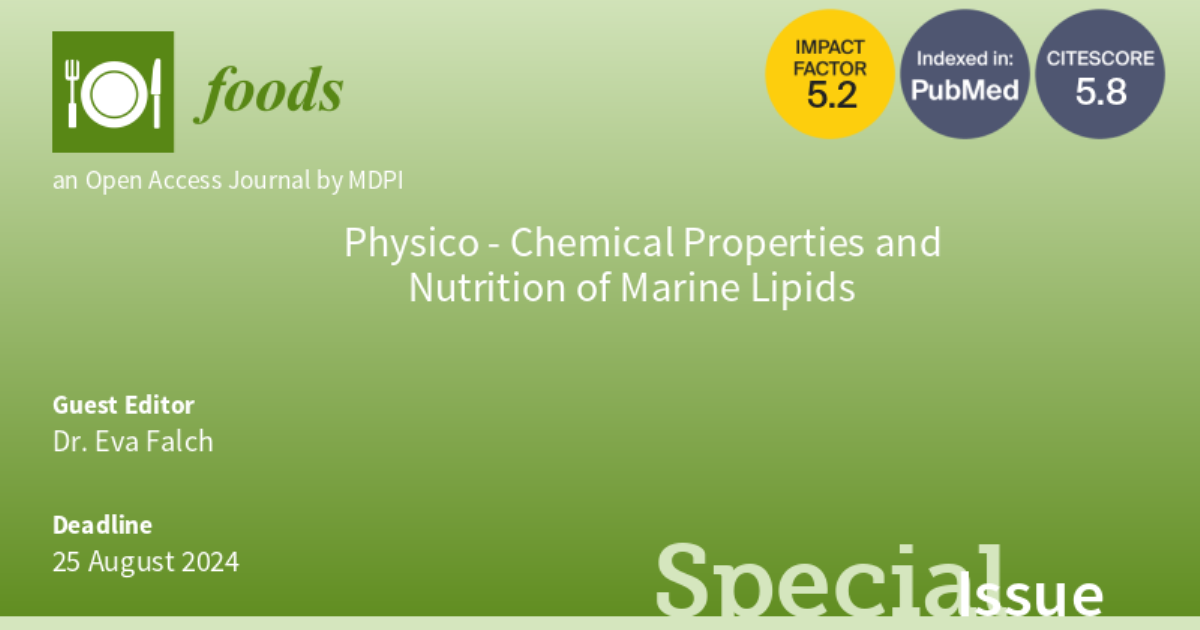Physico-Chemical Properties and Nutrition of Marine Lipids
A special issue of Foods (ISSN 2304-8158). This special issue belongs to the section "Food Nutrition".
Deadline for manuscript submissions: 25 August 2024 | Viewed by 2447

Special Issue Editor
Interests: seafood; seafood quality; biotechnology; food science and technology; marine lipids; omega-3 fatty acids; marine ingredients; bioeconomy; rest raw material; seafood side-streams; sustainable food; framework; food preservation; green technologies; food education
Special Issue Information
Dear Colleagues,
Marine lipids, and especially long chain polyunsaturated omega-3 fatty acids, play important roles in human nutrition and health. Despite their well-documented health effects, the global population do not eat enough seafood and generally do not meet the recommended levels of these omega-3 fatty acids through their diet. Marine lipids may be used as ingredient in food products, and an increased understanding of their physio-chemical and nutritional properties, as well as their stability in a food matrix, could help in improving their potential use.
The ocean comprises many species that, today, are not utilised as food. These can be species at lower tropic levels than those caught for commercial fisheries and may become future food ingredients. Additionally, seafood resources that are lost through value chains may be upcycled as marine lipids sources for human consumption.
This Special Issue invites original research and review papers with new knowledge in order to increase the future consumption of marine lipids. This could include new and current marine lipid resources and their properties in food, composition and stability, logistics and value chains, extraction and refinement, technologies, and consumer insight regarding marine lipids in food. Papers focusing on physio-chemical properties and nutrition of marine lipids are particularly welcome.
Dr. Eva Falch
Guest Editor
Manuscript Submission Information
Manuscripts should be submitted online at www.mdpi.com by registering and logging in to this website. Once you are registered, click here to go to the submission form. Manuscripts can be submitted until the deadline. All submissions that pass pre-check are peer-reviewed. Accepted papers will be published continuously in the journal (as soon as accepted) and will be listed together on the special issue website. Research articles, review articles as well as short communications are invited. For planned papers, a title and short abstract (about 100 words) can be sent to the Editorial Office for announcement on this website.
Submitted manuscripts should not have been published previously, nor be under consideration for publication elsewhere (except conference proceedings papers). All manuscripts are thoroughly refereed through a single-blind peer-review process. A guide for authors and other relevant information for submission of manuscripts is available on the Instructions for Authors page. Foods is an international peer-reviewed open access semimonthly journal published by MDPI.
Please visit the Instructions for Authors page before submitting a manuscript. The Article Processing Charge (APC) for publication in this open access journal is 2900 CHF (Swiss Francs). Submitted papers should be well formatted and use good English. Authors may use MDPI's English editing service prior to publication or during author revisions.
Keywords
- marine lipids
- seafood resources
- functional properties
- physiochemical properties
- functional ingredients
- food matrix
- food composition
- consumer science
- lipid nutrition
- side-stream utilization






